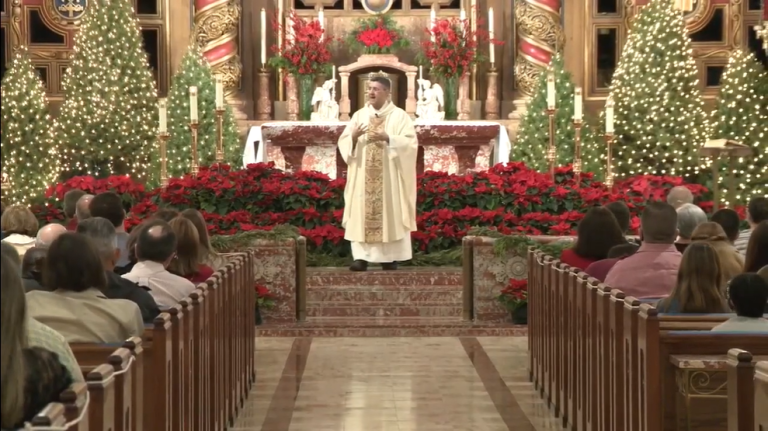Coverage of the Notre Dame fire has ascended to the ranks of the world’s top headlines and has thus occupied the attention of Catholics, non-Catholics, and former Catholics this week – Holy Week – a week generally marked by the discovery of a “lost gospel,” the release of the latest Dan Brown novel, or mall-sightings of the Easter Bunny.
It seems, at least for this Holy Week, as the evangelizing Church stands on the doorstep of the Paschal Triduum and prepares to come face to face with her most sacred mysteries, the media has flipped the script, giving the world occasion to talk about and collectively mourn this universally regarded tragedy.
Church, we have on our hands a unique evangelization moment! It’s likely in the days ahead that Notre Dame Cathedral will be the subject of work-time small talk, an informal discussion among friends, or Easter Sunday dinner conversation. You’ll find yourself with opportunities to make comments, to weigh in, to express sentiments of an understood grief, and to ask questions.
It’s not a teaching moment – not even a catechetical moment. Or, I should say, not merely a catechetical moment. It’s an evangelization moment! Don’t miss it.
Why Does Notre Dame Matter?
In that moment, what will you say? Relating the latest news on the extent of the damage, the dollar amount raised to date for the rebuild, or even the priceless items that were spared or rescued (however heroically) will likely not be enough.
Instead, something more fundamental must be addressed: Why does Notre Dame matter?
First, it must be acknowledged that Notre Dame does matter. People are upset. Non-Christians are upset. The common experience is one of a deep sense of loss and the word tragedy has been used somewhat incautiously with little opposition.
Yes, some will say, “It’s just a building,” but such a response doesn’t seem to do justice to people’s experience. Rather, a certain value-response is considered appropriate, if not expected. Why?
As Catholics, we recognize Notre Dame Cathedral to be valuable first because it is the arena of the Holy Mass, where the Eucharist is consecrated and celebrated! It’s more than a tourist attraction or a national treasure. But for the non-believer it’s precisely that; a museum, a cultural icon, an architectural feat, nothing more. And yet the value-response we’ve witnessed this week seems to far exceed these descriptions. Why?
Although there’s much to be said on this question, I think one point is most helpful for evangelization, especially pre-evangelization: Notre Dame matters because it is beautiful.
Someone might say, “The destruction of Notre Dame is not a real tragedy.” Certainly, no one died and it would be all too easy to point to other tragedies involving a loss of human life (i.e., the evil of abortion, wars, terrorist attacks, etc.) that would be worthy of our prayers, financial support, and media coverage. But this is a false dichotomy. Life and what makes life beautiful (i.e., love, art, poetry, leisure, culture, liturgy, worship, etc.) are not at odds. We mourn the loss of life, in part, because we recognize those lives to be worthy of such beauties. For example, when someone dies, we indirectly mourn that they will no longer be able to travel to Paris and behold the beauty of Notre Dame.
And now, at least in its present state, compared to its former glory, neither can we. And we mourn that.
Rounding Third and Heading for “Home”
“For the world in its present form is passing away” (1 Cor. 7:31).
Every structure will eventually fall. Those things prized for their permanence in this life will one day pass away. We ourselves will die. Could it be that in collectively lamenting the loss suffered by Notre Dame Cathedral, we are actually acknowledging the utter finitude of life, including our own mortality, even anticipating our own death? I would argue for the affirmative.
The human person desires permanence; we have a transcendental desire for a perfect “home” where we are safe, known, and loved, forever. We get glimpses of it in this life, but no home seems to finally and forever satisfy the desire. Friends move, loved ones pass away, and cathedrals fall down. What are we to make of this?
Herein lies the content of the evangelization moment!
In the face of this tragic dimension of life, we may arrive at two possible conclusions:
Life is an absurdity (name your modern philosopher on this point); or
The human person is a pilgrim in this life; on a journey to the only “home” that will ultimately satisfy the desire of his heart.
As Catholics, we affirm the second! And a simple conversation on the Notre Dame fire may provide us with the perfect opportunity to speak this truth into the life of someone this week.
C.S. Lewis said:
“If we find ourselves with a desire that nothing in this world can satisfy, the most probable explanation is that we were made for another world.”
We are “man on the way” – homo viator. In his book by the same name, writing on the negation of death, 20th century philosopher Gabriel Marcel remarked:
“The world seems to assure me cynically that this tenderly loved being no longer exists on its lists, that he has been struck off the universal register – and I for my part claim that he exists all the same and that he cannot help existing.”
Here we arrive at the heart of the Christian claim and the substance of the Paschal Triduum: He suffered under Pontius Pilate, was crucified, died, and was buried. He descended into hell. On the third day He rose again.
This is our faith! This is our resolute hope; to share it against the despair of death and destruction – even that of one of the world’s most historic cathedrals – is our joy! All of Lent has been leading up to this: Holy Thursday, Good Friday, and Easter Sunday. This is the moment we’ve been waiting for!
Don’t miss it.
Ryan Mahle




